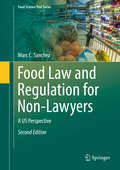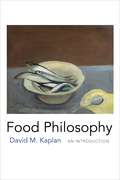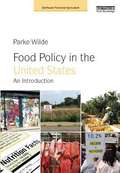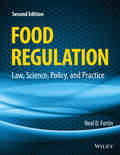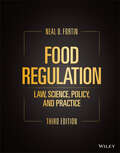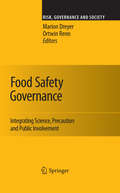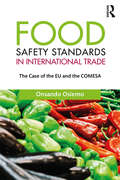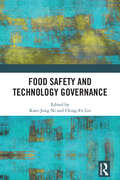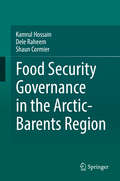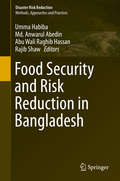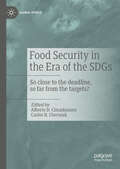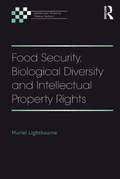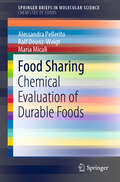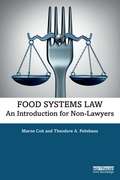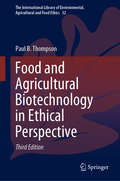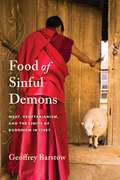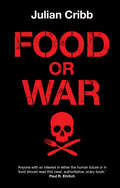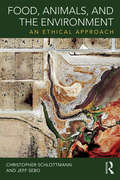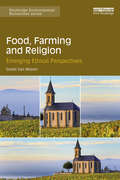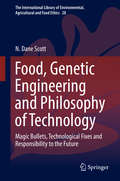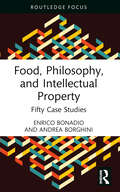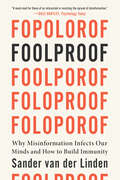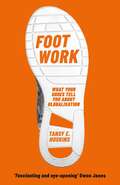- Table View
- List View
Food Law and Regulation for Non-Lawyers: A Us Perspective (Food Science Text Ser.)
by Marc C. SanchezDesigned and modeled after a six-week introductory food law course taught at Northeastern University, Food Law and Regulation for Non-Lawyers offers a succinct overview of key topics and core concepts for food scientists, quality managers, and others who need to understand the regulation of food in the U.S. This second edition includes critical updates on the Food Safety Modernization Act-- the first change to the food safety laws in over 70 years. The seven foundational rules, finalized in 2015, are discussed in detail. The new edition also includes other regulatory updates such as the new Nutrition Fact Panel, changes to the definition of fiber, and the FDA’s attempt to regulate the widely used “healthy” claim. These timely updates, along with the core concepts of the first edition, make the volume an essential and practical tool for regulatory professionals.
Food Law in the United States
by Michael T. RobertsAs the modern food system continues to transform food - its composition, taste, availability, value, and appearance - consumers are increasingly confronted by legal and regulatory issues that affect us all on a daily basis. In Food Law in the United States, Michael T. Roberts addresses these issues in a comprehensive, systematic manner that lays out the national legal framework for the regulation of food and the legal tools that fill gaps in this framework, including litigation, state law, and private standards. Covering a broad expanse of topics including commerce, food safety, marketing, nutrition, and emerging food-systems issues such as local food, sustainability, security, urban agriculture, and equity, this book is an essential reference for lawyers, students, non-law professionals, and consumer advocates who must understand food law to advance their respective interests.
Food Philosophy: An Introduction (California Studies In Food And Culture Ser. #39)
by David M. KaplanFood is a challenging subject. There is little consensus about how and what we should produce and consume. It is not even clear what food is or whether people have similar experiences of it. On one hand, food is recognized as a basic need, if not a basic right. On the other hand, it is hard to generalize about it given the wide range of practices and cuisines, and the even wider range of tastes.This book is an introduction to the philosophical dimensions of food. David M. Kaplan examines the nature and meaning of food, how we experience it, the social role it plays, its moral and political dimensions, and how we judge it to be delicious or awful. He shows how the different branches of philosophy contribute to a broader understanding of food: what food is (metaphysics), how we experience food (epistemology), what taste in food is (aesthetics), how we should make and eat food (ethics), how governments should regulate food (political philosophy), and why food matters to us (existentialism). Kaplan embarks on a series of philosophical investigations, considering topics such as culinary identity and authenticity, tasting and food criticism, appetite and disgust, meat eating and techno-foods, and consumerism and conformity. He emphasizes how different narratives help us navigate the complex world of food and reminds us we all have responsibilities to ourselves, to others, and to animals. An original treatment of a timely subject, Food Philosophy is suitable for undergraduates while making a significant contribution to scholarly debates.
Food Policy in the United States
by Parke WildeThis book offers a broad introduction to food policies in the United States. Real-world controversies and debates motivate the book's attention to economic principles, policy analysis, nutrition science and contemporary data sources. It assumes that the reader's concern is not just the economic interests of farmers, but also includes nutrition, sustainable agriculture, the environment and food security. The book's goal is to make US food policy more comprehensible to those inside and outside the agri-food sector whose interests and aspirations have been ignored. The chapters cover US agriculture, food production and the environment, international agricultural trade, food and beverage manufacturing, food retail and restaurants, food safety, dietary guidance, food labeling, advertising and federal food assistance programs for the poor. The author is an agricultural economist with many years of experience in the non-profit advocacy sector, the US Department of Agriculture and as a professor at Tufts University. The author's well-known blog on US food policy provides a forum for discussion and debate of the issues set out in the book.
Food Regulation: Law, Science, Policy, and Practice
by Neal D. FortinFeaturing case studies and discussion questions, this textbook - with revisions addressing significant changes to US food law - offers accessible coverage appropriate to a wide audience of students and professionals. * Overviews the federal statutes, regulations, and regulatory agencies concerned with food regulation and introduces students to the case law and statutory scheme of food regulation* Focuses updated content on the 2011 FDA Food Safety Modernization Act (FSMA), the biggest change to US food law since the 1930s* Contains over 20% new material, particularly a rewritten import law chapter and revisions related to food safety regulation, health claims, and food defense* Features case studies and discussion questions about application of law, policy questions, and emerging issues
Food Regulation: Law, Science, Policy, and Practice
by Neal D. FortinFOOD REGULATION Provides both students and professionals with up-to-date coverage of US food regulatory law Food Regulation: Law, Science, Policy, and Practice presents an in-depth yet accessible account of all key aspects of United States food regulation. Using a modified casebook format, this comprehensive textbook introduces readers to the case law and statutory scheme of food regulation, defines the inspection authority and enforcement tools of various regulatory agencies, discusses current and emerging public policy issues, and more. Readers explore a wide range of topics in food law, science, policy, and practice; which connect legal theory to practical application. The third edition is fully updated to reflect significant changes in US food law, such as the regulations implementing the FDA Food Safety Modernization Act (FSMA) and the National Bioengineered Food Disclosure Standard. New case studies and discussion questions highlight important legal trends, policy debates, and application of current law. Offering thorough, highly practical coverage of food regulatory law, this authoritative volume: Features new and updated material on US food law, including recent regulations concerning novel food processing Covers requirements of food labeling, advertising and health claim guidelines, regulation of US food imports and exports, and international food law Discusses important topics such as food defense, regulation of biotechnology, ethical issues, product liability, food safety rules, and substantiation of health claims Includes a brief history of food regulation and an overview of US government agency organization and jurisdictions Contains problem exercises covering different aspects of food law designed to strengthen critical thinking Food Regulation: Law, Science, Policy, and Practice, Third Edition, remains the ideal textbook for undergraduate and graduate courses in agriculture, food science, dietetics, law, and regulatory compliance management. It is also a must-have reference for food scientists, attorneys, researchers, quality assurance and regulatory specialists, and other industry professionals responsible for complying with US food regulation.
Food Safety Governance
by Ortwin Renn Marion DreyerThis book offers a detailed analysis and a set of carefully measured suggestions towards achieving greater integration of science, precaution, and public involvement in current arrangements for European food safety governance. The devised governance framework provides a distinctive system of methodologies, participatory processes, and institutional configurations that demonstrates practical advice of how complex and conflicting food safety demands might be reconciled. At the core of the suggestions for procedural reform is a design with four governance stages (framing, assessment, evaluation, management, with participation and communication as cross-cutting activities), and an organisation into four assessment and management tracks distinguishing between risk-, precaution-, concern- and prevention-based approaches. In addition, the book suggests an innovative food safety interface structure designed to improve the politics-science-society coordination throughout the governance process.
Food Safety Standards in International Trade: The Case of the EU and the COMESA
by Onsando OsiemoFood safety has become a major concern for consumers in the developed world and Europe in particular. This has been highlighted by the recent spate of food scares ranging from the BSE (mad cow) crisis to Chinese melamine contamination of baby formula. To ensure food safety throughout Europe, stringent food safety standards have been put in place ‘from farm to fork’. At the same time, poor African countries in the COMESA rely on their food exports to the European market to achieve their development goals yet have difficulty meeting the EU food safety standards. This book examines the impact of EU food safety standards on food imports from COMESA countries. It also critically examines both EU and COMESA food safety standards in light of the WTO SPS Agreement and the jurisprudence of the WTO panels and Appellate Body. The book makes ground-breaking proposals on how the standards divide between the EU and the COMESA can be bridged and discusses the impact of EU food safety standards on food imports from poor African countries.
Food Safety Standards in International Trade: The Case of the EU and the COMESA
by Onsando OsiemoFood safety has become a major concern for consumers in the developed world and Europe in particular. This has been highlighted by the recent spate of food scares ranging from the BSE (mad cow) crisis to Chinese melamine contamination of baby formula. To ensure food safety throughout Europe, stringent food safety standards have been put in place ‘from farm to fork’. At the same time, poor African countries in the COMESA rely on their food exports to the European market to achieve their development goals yet have difficulty meeting the EU food safety standards. This book examines the impact of EU food safety standards on food imports from COMESA countries. It also critically examines both EU and COMESA food safety standards in light of the WTO SPS Agreement and the jurisprudence of the WTO panels and Appellate Body. The book makes ground-breaking proposals on how the standards divide between the EU and the COMESA can be bridged and discusses the impact of EU food safety standards on food imports from poor African countries.
Food Safety and Technology Governance
by Kuei-Jung Ni Ching-Fu LinRecent advances in agri-food technology have brought about increasing complexity and emerging challenges to food safety regulation and governance, with many countries greatly divided in their regulatory approaches. As more advanced CRISPR based gene-editing technologies, and novel foods such as cloned animal products, non-traditional plants, nanofood, and plant-based meat are rapidly being developed, debates arise as to whether the existing models of governance require revision to ensure consumer safety. Of equal importance is the extensive use of pesticides, additives, and animal drugs which raise concerns over the methods and approaches of government approval and phasing out of potentially risk-causing chemicals. Heightened public criticism of food safety and technology poses a significant challenge to governments around the world, which struggle to strike a proper balance between technocracy- and democracy-oriented risk governance models. Drawing on expertise from the United States, European Union, Japan, China, Korea, Association of South East Asian Nations, Malaysia, and Taiwan, this book explores existing and emerging issues of food law and policy in the context of technology governance to offer an overarching framework for the interaction between food regulation and technology. It will be essential reading for academics, students and practitioners with an interest in food law and policy, agricultural law and policy and food safety and nutrition studies.
Food Security Governance in the Arctic-Barents Region
by Kamrul Hossain Dele Raheem Shaun CormierFood Security Governance in the Arctic-Barents Region provides a multidisciplinary perspective on the major food security and safety challenges faced in the Arctic region. The authors address existing gaps in current knowledge of the coordination and implementation of legal framework and policy that affects the Arctic. The volume is unique in its focus on the Barents region, an area of northern Europe containing Norway, Sweden, Finland and Russia. The region has a population of approximately 5.2 million, including indigenous and non-indigenous peoples. The authors offer a balanced and systemic review of the role of traditional foods in this region, along with an overview of the regulatory tools and institutions that govern food security. Food security and safety in the –Arctic-Barents region is connected to and impacted by transformations from both inside and outside the area. Climate change, globalization and human activities affect the availability, accessibility, and affordability of food. The result of these transformations has an impact on the food security and safety for both indigenous and non-indigenous individuals and communities. The authors, by highlighting these challenges, reveal the importance of having harmonized policies and legal tools in place in order to strengthen food security and safety in the Barents region. The book forms part of the main outcome of the Academy of Finland’s ongoing project on Human Security as a promotional tool for societal security in the Arctic: Addressing Multiple Vulnerability to its Population with Specific Reference to the Barents Region (HuSArctic). Researchers, policy makers, and other stakeholders will find the book to be an important contribution to the promotion of policies and strategies on food security.
Food Security and Risk Reduction in Bangladesh
by Rajib Shaw Umma Habiba Md. Anwarul Abedin Abu Wali Raghib HassanThis book draws examples from food security issues in Bangladesh. The book is structured around those issues and underlying causes of food security, the implications from different sectors, policy analysis, and the role and actions of various stakeholders from different sectors to ensure food security. Bangladesh is situated in a climatically vulnerable position and is impacted frequently by such climatic hazards as floods, cyclones, droughts, and salinity intrusion. Due to global atmospheric changes, abrupt shifts in climatic conditions severely affect Bangladesh's agriculture. Although Bangladesh has made significant progress in increasing domestic production of food grain, if the production of major cereals is hampered due to climate change, food security will be in jeopardy. Most estimates show that a huge amount of additional food grain will be required to feed the growing population of the country. Ensuring food security for all is the overarching goal of Bangladesh's national food policy. Therefore, ensuring food security in the future requires a great deal of additional effort in yield improvement, with limited scope for expanding the area under cultivation. The primary target readers for this book are students and researchers in the fields of environment, disaster risk reduction, and climate change studies. The book will provide them with a good idea of the current trend of research in the field and will furnish basic knowledge on this important topic. Another target group comprises practitioners and policy makers, who will be able to apply collective knowledge to policy and decision making.
Food Security in the Era of the SDGs: So close to the deadline, so far from the targets? (Global Ethics)
by Alberto D. Cimadamore Carlos B. CherniakThis book addresses the challenges to achieve food security, which can arguably be one of the axis of any transformational solution to the structural production and reproduction of hunger, malnutrition, and poverty. According to the picture depicted in the book, access to sufficient and safe food is not guaranteed for approximately 2.4 billion people, with women and children in rural areas being the most significantly affected. Particularly, the situation concerning children has set off all the alarms. Based on the data offered in the different chapters, the authors estimate that would be very difficult -if not impossible- to achieve the most important global objectives that the international community has committed to achieving by 2030: ending poverty, hunger, and food insecurity. This way, the most ambitious and well-intended development initiative the international community was able to put together in the history of humankind (the Agenda 2030) is derailing. Urgent expansion in the supply of the nutritious foods that constitute a healthy diet and a shift in consumption patterns are required -among other things- to effectively address SDGs targets. The book presents and discusses contributions of authors who have been thinking and facing those challenges in the academia and decision-making spheres. It is also a relevant contribution to rethinking the public policies of Latin American and Caribbean (LAC) countries, as well as the technical cooperation and financial assistance schemes for the region. The rethinking exercise sketched here places LAC both as a critical scenario and as a laboratory for envisioning innovative solutions that have the potential to not only transform the regional reality but also to be replicated in other regions with the proper adaptation to different contexts.
Food Security, Biological Diversity and Intellectual Property Rights (Intellectual Property, Theory, Culture)
by Muriel LightbourneThis volume advances the claim that the FAO International Treaty on Plant Genetic Resources for Food and Agriculture (ITPGRFA) adopted in 2001 is the only existing international agreement with the potential to promote food security, conservation of biodiversity and equity. However, for germplasm-rich countries, national interests come into conflict with the global interest. This work shows that the pursuit of national interests is counterproductive when it comes to maintaining genetic resources, food-security and rent-seeking and that optimally, the coverage of the FAO Treaty should be widened to apply to all crops.
Food Sharing: Chemical Evaluation of Durable Foods (SpringerBriefs in Molecular Science)
by Maria Micali Alessandra Pellerito Ralf Dounz-WeigtThis book presents the concept of food sharing from a European perspective, and provides a concise analysis of its safety implications and the chemical properties of recovered foods.In our modern world, 33% of the total food produced is lost each year, with serious economic, environmental and social consequences. Food worth approximately 1 trillion USD is wasted per year, and it is estimated that this wasted food could feed more than 3.4 billion people. Considering that 1/10 of the global population still does not have enough money for basic needs, and in view of the impact of consumer behaviour, food retailers and industry in food waste, food sharing appears to be an attractive solution, and several communities have recently been created with the main goal of saving food and giving it to those in need. Despite the positive impact of food sharing, it also raises concerns since recovered foods are subject to spoilage, decay and irreversible chemical-physical transformations.In this book, the authors explore the current situation and the regulatory definition of food sharing in various European countries, presenting the German experience in the city of Magdeburg, where food-sharing networks have been implemented. They also discuss the chemical and safety evaluations of durable foods, and provide a simulation of food waste by comparing a food product with the same food produced with re-worked and still edible raw materials (recovered foods).
Food Systems Law: An Introduction for Non-Lawyers
by Theodore A. Feitshans Marne CoitFood law is a rapidly developing area, with interest being driven at the consumer, handler and farm level. This introductory textbook provides an overview of the concepts necessary for an understanding of food law and regulations, providing the non-specialist reader with a more comprehensive understanding of food systems from production to consumption. Food Systems Law first introduces the US legal system and then moves on to explain the Federal Regulation of Food systems, the Food Safety Modernization Act (FSMA) and the Farm Bill, the single most important piece of legislation which impacts the way in which federal resources are used within the food industry. The following chapters provide concise explanations of key topics including food safety, food labeling, organic certification and food waste, with examples from US law and policy included. Importantly, the book also addresses key topics which overlap with food law, such as environmental, health and agricultural law. This textbook is geared towards a non-legal audience, particularly students of interdisciplinary food studies and food science who are taking food law courses, as well as those studying agricultural law, food policy and environmental law. It will also be of interest to professionals working in the food industry and those who want to learn more about how food is regulated.
Food and Agricultural Biotechnology in Ethical Perspective (The International Library of Environmental, Agricultural and Food Ethics #32)
by Paul B. ThompsonThis 3rd edition of Food and Agricultural Biotechnology in Ethical Perspective updates Thompson’s analysis to reflect the next generation of biotechnology, including synthetic biology, gene editing and gene drives. The first two editions of this book, published as Food Biotechnology in Ethical Perspective in 1997 and 2007, were the first comprehensive philosophical studies of genetic engineering applied to food systems. The book is structured with chapter length treatments of risk in four categories: food safety, to animals, to the environment and socio-economic risks. These chapters are preceded by two chapters providing orientation to the uses of gene technology in food and agriculture, and to the goals, methods and background assumptions of technological ethics. There is also a chapter covering all four types of risk as applied to the first US technology, recombinant bovine somatotropin. The last four chapters take up 1) intellectual property debates, 2) religious, metaphysical and “intrinsic” objections to biotechnology, 3) issues in risk and trust and 4) a review of ethical issues in synthetic biology, gene editing and gene drives, the three key technologies that have emerged since the book was last revised.
Food of Sinful Demons: Meat, Vegetarianism, and the Limits of Buddhism in Tibet (Studies of the Weatherhead East Asian Institute, Columbia University)
by Geoffrey BarstowTibetan Buddhism teaches compassion toward all beings, a category that explicitly includes animals. Slaughtering animals is morally problematic at best and, at worst, completely incompatible with a religious lifestyle. Yet historically most Tibetans—both monastic and lay—have made meat a regular part of their diet. In this study of the place of vegetarianism within Tibetan religiosity, Geoffrey Barstow explores the tension between Buddhist ethics and Tibetan cultural norms to offer a novel perspective on the spiritual and social dimensions of meat eating.Food of Sinful Demons shows the centrality of vegetarianism to the cultural history of Tibet through specific ways in which nonreligious norms and ideals shaped religious beliefs and practices. Barstow offers a detailed analysis of the debates over meat eating and vegetarianism, from the first references to such a diet in the tenth century through the Chinese invasion in the 1950s. He discusses elements of Tibetan Buddhist thought—including monastic vows, the Buddhist call to compassion, and tantric antinomianism—that see meat eating as morally problematic. He then looks beyond religious attitudes to examine the cultural, economic, and environmental factors that oppose the Buddhist critique of meat, including Tibetan concepts of medicine and health, food scarcity, the display of wealth, and idealized male gender roles. Barstow argues that the issue of meat eating was influenced by a complex interplay of factors, with religious perspectives largely supporting vegetarianism while practical concerns and secular ideals pulled in the other direction. He concludes by addressing the surge in vegetarianism in contemporary Tibet in light of evolving notions of Tibetan identity and resistance against the central Chinese state. The first book to discuss this complex issue, Food of Sinful Demons is essential reading for scholars interested in Tibetan religion, history, and culture as well as global food history.
Food or War
by Julian CribbOurs is the Age of Food. Food is a central obsession in all cultures, nations, the media, and society. Our future supply of food is filled with risk, and history tells us that lack of food leads to war. But it also presents us with spectacular opportunities for fresh human creativity and technological prowess. Julian Cribb describes a new food system capable of meeting our global needs on this hot and overcrowded planet. This book is for anyone concerned about the health, safety, affordability, diversity, and sustainability of their food - and the peace of our planet. It is not just timely - its message is of the greatest urgency. Audiences include consumers, 'foodies', policymakers, researchers, cooks, chefs and farmers. Indeed, anyone who cares about their food, where it comes from and what it means for them, their children and grandchildren.
Food, Animals, and the Environment: An Ethical Approach
by Christopher Schlottmann Jeff SeboFood, Animals, and the Environment: An Ethical Approach examines some of the main impacts that agriculture has on humans, nonhumans, and the environment, as well as some of the main questions that these impacts raise for the ethics of food production, consumption, and activism. Agriculture is having a lasting effect on this planet. Some forms of agriculture are especially harmful. For example, industrial animal agriculture kills 100+ billion animals per year; consumes vast amounts of land, water, and energy; and produces vast amounts of waste, pollution, and greenhouse gas emissions. Other forms, such as local, organic, and plant-based food, have many benefits, but they also have many costs, especially at scale. These impacts raise difficult ethical questions. What do we owe animals, plants, species, and ecosystems? What do we owe people in other nations and future generations? What are the ethics of risk, uncertainty, and collective harm? What is the meaning and value of natural food in a world reshaped by human activity? What are the ethics of supporting harmful industries when less harmful alternatives are available? What are the ethics of resisting harmful industries through activism, advocacy, and philanthropy? The discussion ranges over cutting-edge topics such as effective altruism, abolition and regulation, revolution and reform, individual and structural change, single-issue and multi-issue activism, and legal and illegal activism. This unique and accessible text is ideal for teachers, students, and anyone else interested in serious examination of one of the most complex and important moral problems of our time.
Food, Farming and Religion: Emerging Ethical Perspectives (Routledge Environmental Humanities)
by Gretel Van WierenAlthough the religious and ethical consideration of food and eating is not a new phenomenon, the debate about food and eating today is distinctly different from most of what has preceded it in the history of Western culture. Yet the field of environmental ethics, especially religious approaches to environmental ethics, has been slow to see food and agriculture as topics worthy of analysis. This book examines how religious traditions and communities in the United States and beyond are responding to critical environmental ethical issues posed by the global food system. In particular, it looks at the responses that have developed within Jewish, Christian, and Islamic traditions, and shows how they relate to arguments and approaches in the broader study of food and environmental ethics. It considers topics such as land degradation and restoration, genetically modified organisms and seed consolidation, animal welfare, water use, access, pollution, and climate, and weaves consideration of human wellbeing and justice throughout. In doing so, Gretel Van Wieren proposes a model for conceptualizing agricultural and food practices in sacred terms. This book will appeal to a wide and interdisciplinary audience including those interested in environment and sustainability, food studies, ethics, and religion.
Food, Genetic Engineering and Philosophy of Technology: Magic Bullets, Technological Fixes and Responsibility to the Future (The International Library of Environmental, Agricultural and Food Ethics #28)
by N. Dane ScottThis book describes specific, well-know controversies in the genetic modification debate and connects them to deeper philosophical issues in philosophy of technology. It contributes to the current, far-reaching deliberations about the future of food, agriculture and society. Controversies over so-called Genetically Modified Organisms (GMOs) regularly appear in the press. The biotechnology debate has settled into a long-term philosophical dispute. The discussion goes much deeper than the initial empirical questions about whether or not GM food and crops are safe for human consumption or pose environmental harms that dominated news reports. In fact, the implications of this debate extend beyond the sphere of food and agriculture to encompass the general role of science and technology in society. The GM controversy provides an occasion to explore important issues in philosophy of technology. Researchers, teachers and students interested in agricultural biotechnology, philosophy of technology and the future of food and agriculture will find this exploration timely and thought provoking.
Food, Philosophy, and Intellectual Property: Fifty Case Studies
by Andrea Borghini Enrico BonadioThis is a book about food, philosophy, and intellectual property rights.Taken separately, these are three well-known subjects, but it is uncommon to consider them together. The book comprises 50 case studies, organized around eight themes: images; genericity and descriptiveness; language traps; procedures; menus, recipes, and creativity; boundaries; biotech; and empowerment. The introductory chapter frames the selection of cases and encourages readers to look beyond them, envisaging new lenses to look at food vis-à-vis intellectual property. The terrain encompassed is wide-ranging and reaches out to fine-grained aspects of food products, recipes, and cooking. Conceived for a wide scope of readers, the volume ultimately interrogates the links between food and cultural identity, bringing to the fore the ethical, political, and aesthetic worth of culinary arts and gastronomic experiences.This accessible book will be of value to scholars, students, practitioners, and others with interests in the areas of intellectual property, food law, and food studies.
Foolproof: Why Misinformation Infects Our Minds And How To Build Immunity
by Sander van der LindenWinner of the SPSP Book Prize for the Promotion of Social and Personality Science • Winner of the 2024 APA William James Book Award • Winner of the 2024 Harvard Goldsmith Book Prize • Winner of the 2024 Nautilus Book Award • A Next Big Idea Club Must-Read • A Financial Times Best Book of the Year • One of Nature’s best science picks • One of Behavioral Scientist’s Notable Books of 2023 Informed by decades of research and on-the-ground experience advising governments and tech companies, Foolproof is the definitive guide to navigating the misinformation age. From fake news to conspiracy theories, from inflammatory memes to misleading headlines, misinformation has swiftly become the defining problem of our era. The crisis threatens the integrity of our democracies, our ability to cultivate trusting relationships, even our physical and psychological well-being—yet most attempts to combat it have proven insufficient. In Foolproof, one of the world’s leading experts on misinformation lays out a crucial new paradigm for understanding and defending ourselves against the worldwide infodemic. With remarkable clarity, Sander van der Linden explains why our brains are so vulnerable to misinformation, how it spreads across social networks, and what we can do to protect ourselves and others. Like a virus, misinformation infects our minds, exploiting shortcuts in how we see and process information to alter our beliefs, modify our memories, and replicate at astonishing rates. Once the virus takes hold, it’s very hard to cure. Strategies like fact-checking and debunking can leave a falsehood still festering or, at worst, even strengthen its hold. But we aren’t helpless. As van der Linden shows based on award-winning original research, we can cultivate immunity through the innovative science of “prebunking”: inoculating people against false information by preemptively exposing them to a weakened dose, thus empowering them to identify and fend off its manipulative tactics. Deconstructing the characteristic techniques of conspiracies and misinformation, van der Linden gives readers practical tools to defend themselves and others against nefarious persuasion—whether at scale or around their own dinner table.
Foot Work: What Your Shoes Are Doing to the World
by Tansy E. HoskinsFrom the author of STITCHED UP: 'Makes a strong case for nothing less than a revolution' Emma Watson'A superb primer on everything that is wrong with our world - and how we can start to change it' NEW INTERNATIONALISTDO YOU KNOW WHERE YOUR SHOES COME FROM?DO YOU KNOW WHERE THEY GO WHEN YOU'RE DONE WITH THEM?In 2018, 66.3 million pairs of shoes were manufactured across the world every single day. They have never been cheaper to buy, and we have never been more convinced that we need to buy them. Yet their cost to the planet has never been greater.In this urgent, passionately argued book, Tansy E. Hoskins opens our eyes to the dark origins of the shoes on our feet. Taking us deep into the heart of an industry that is exploiting workers and deceiving consumers, we begin to understand that if we don't act fast, this humble household object will take us to the point of no return.
